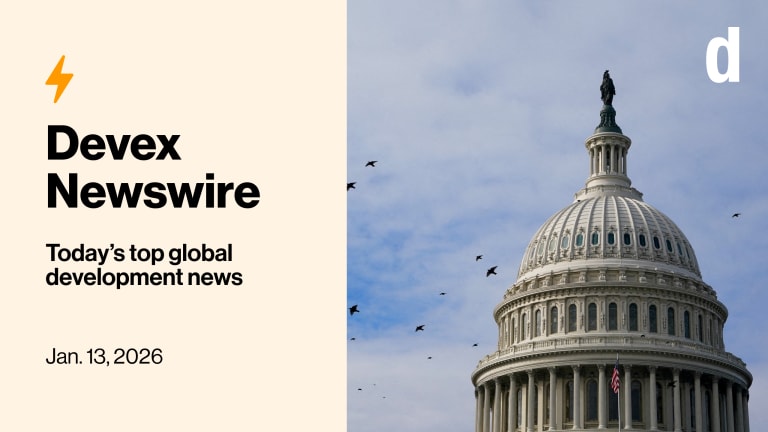
This is a preview of our daily Newswire. Sign up to this newsletter to receive an inside look at the biggest stories in global development.
U.S. President Joe Biden released a budget blueprint that would boost U.S. international affairs spending by $6.8 billion next year.
On Friday, Biden’s administration released its “skinny budget,” a top-line preview of the full White House budget request for fiscal year 2022, which is expected to arrive in the next couple of months. Biden called for $63.5 billion in international affairs spending, which would be a 12% increase over 2021 spending.
• Biden was widely expected to propose a significant increase in foreign aid spending. His first budget blueprint includes new money for some of the administration’s biggest development priorities, including global health security, climate change, and Central American assistance.
• While some aid advocates applauded the White House’s endorsement of development as a pillar of its foreign policy, the requested total was less than some had hoped. Liz Schreyer of U.S. Global Leadership Coalition urged U.S. lawmakers to consider Biden’s request, “the floor in all Fiscal Year 2022 negotiations.”
• Biden has called for major spending increases to fund his domestic policy agenda, and that might limit how ambitious he is willing to be in funding for international affairs. While this proposal shows his administration intends to support, and in some cases grow, U.S. development programs, it appears more of an incremental boost than a transformational one.
Read: Biden proposes $6.8B boost for US international budget
BLIND SPOT
Slow onset climate hazards such as sea level rise get less attention than intensive disasters, but in Asia, they account for an estimated two-thirds of disaster-related economic losses. Social protection initiatives have also tended to focus on providing payments in the wake of a sudden disaster, while those who experience creeping losses — from drought, for example — aren’t often covered by those safety nets.
Nithin Coca reports on the missing link between slow-onset climate hazards and social protection in Southeast Asia — and what is being done about it.
5 USAID JOB HUNT TIPS
USAID has received over 20,000 applications for foreign service jobs over the past year. The agency is currently halfway through a two-year hiring surge — but even with hundreds of open positions, competition is tough.
Emma Smith speaks to Bob Leavitt, the agency’s talent chief, to pick up five tips for USAID job seekers looking to stand out from the crowd.
Read: 5 job application tips from USAID's chief of talent
SPRING MEETINGS RECAP
The World Bank and IMF Spring Meetings wrapped up over the weekend. Here are some of the key takeaways:
• World Bank shareholders expressed support for moving the International Development Association’s replenishment forward one year after the fund saw a large share of its resources deployed early for pandemic response. IDA’s 20th replenishment is now expected to conclude in December.
• David Malpass announced the core pieces of the bank’s new climate action plan. It includes a commitment that 35% of the bank’s funding will have climate co-benefits, a plan to spend half of climate finance on adaptation, and a pledge to align the World Bank’s operations with the Paris climate agreement by 2023.
• Debt relief initiatives were extended, and IMF secured support for an issuance of $650 billion in Special Drawing Rights.
Devex Pro: Janadale Coralde and Miguel Tamonan have this in-depth breakdown of World Bank contracting trends from 2017-2020.
‘MORAL FORCE’
“At the very moment when international development aid is needed most, Covid and national politics have conspired to cut bilateral aid commitments by 30% last year from $108bn to $79bn.” — Gordon Brown, former U.K. prime minister
Warning of “vaccine apartheid,” Brown’s editorial in The Guardian today calls on the G-7 to demand — and fund — mass vaccinations across the globe.
IN THE NEWS
The U.S. mulls a cash transfer program for Northern Triangle countries to curb migration, according to Roberta Jacobson, outgoing White House southern border coordinator. [Reuters]
China's director for disease control acknowledged Saturday that Chinese COVID-19 jabs have a low efficacy rate, adding that mixing in doses of foreign-made vaccines is "under formal consideration." [Al Jazeera]
Despite its promise to reverse Trump-era policies on immigration, the Biden administration is poised to receive fewer refugees than that of any modern president. [Washington Post]
Two deaths have been recorded in connection with Friday's protests against U.N. peacekeeping forces in the Democratic Republic of Congo. [US News]
Sign up to Newswire for an inside look at the biggest stories in global development.








